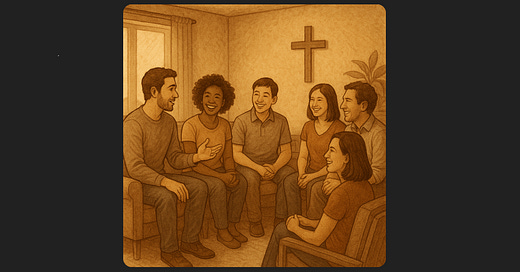IC vs ROC: (18 of 20) ROC’s Transformative Potential
Outlines how intentional ROC structures based explicitly on Matthew 18 foster profound spiritual growth, relational integrity, and authentic Kingdom community.
IC vs ROC: (18 of 20) ROC’s Transformative Potential
Ever been to one of those big ol' family reunions? You know the kind—great aunt Ruth is cornering someone to reminisce about her childhood cat, cousins you've never met awkwardly shaking your hand, and somebody's crying because their potato salad got snubbed. It's family, and you love 'em, but sometimes it's just a bit much. You leave thinking: I love these folks, but why don't we ever get past small talk?
Church can feel exactly like that sometimes. You gather in a building, sing the same songs, nod politely during the sermon, and dart for the exit afterward—connection is shallow, smiles forced, hearts hungry for more. And ironically, in the place where relationships should flourish most richly, they often just...don't.
Now imagine a different sort of gathering, something smaller and intentional. A circle of folks genuinely sharing their lives. They're not there to perform or posture; they're there to live Matthew 18 together, straight-up, no chaser. Jesus set the stage when he tackled that uncomfortable question from his disciples, "Who is the greatest in the kingdom of heaven?" (Matthew 18:1). The disciples, bless their hearts, were looking to climb the spiritual ladder. Jesus flipped the script: greatness, he said, looks like humble vulnerability, like sincere care for one another, like seeking and rescuing the lost sheep with fierce intentionality (Matthew 18:10-14).
What if church could be that? Not a performance, not an obligation, not a hierarchy—but a transformative community, powered by authentic relationships, deeply shaped by the blueprint Jesus laid down.
In Recipe-Oriented Congregations (ROCs), that's exactly what's happening. Folks gather in groups small enough to ditch the hierarchy. Instead of power dynamics, you get mutual accountability. Instead of superficial interactions, you get genuine relational integrity. Instead of personal spiritual ambition at the expense of others, relationships are front and center, driving real growth. Spiritual transformation happens, almost effortlessly, because relationships—and thus love—are the priority.
Here's a reality check: you can't fake love in a ROC. Nobody has the room—or patience—for posturing. Matthew 18 is clear about facing conflicts directly, kindly, and immediately (Matthew 18:15-17). It might feel uncomfortable at first, sure. But, as anyone who's navigated through honest, loving conflict resolution can attest, the depth of the relationship afterward is incomparable. It’s solid gold, my friends.
The relational integrity fostered in a ROC goes beyond surface-level "churchy" niceties. It creates authentic Kingdom communities—places where, yeah, maybe your potato salad isn't always everyone's favorite, but your heart is known, seen, and cherished. And guess what? When you're truly known, growth happens. Personal growth isn't neglected; far from it. Superior personal growth flourishes precisely because you're held gently, deeply, in loving community.
But let's be straight: Institutional Churches (ICs) aren't getting this. They’re stuck in the old wineskin of human hierarchy, desperately trying to patch the holes, unaware that the whole structure can't hold the fresh wine Jesus offers. They drift toward the desires of people, because, honestly, they rely on those people for survival. Love, real love, the transformative Matthew 18 kind? Often that's secondary, tertiary, or entirely absent.
Jesus didn't mince words about our responsibility to one another. He didn't just tell pretty stories about sheep to fill airtime. Everyone listening knew exactly what he meant: shepherds must bring every sheep safely home. No exceptions. No excuses. That's ROC life, friends—each person truly valued, truly cared for.
And here's the kicker: good-hearted Christians settle for ICs because they fear loneliness. They fear stepping away into uncertainty. But given a vision of a different reality—of intentional ROC structures—they'd leap, heart-first, into this richer experience of Kingdom community. Relationships in ROCs aren't a nice addition to church—they are church.
Let me leave you with a few thoughts to chew on: Have you ever experienced church as a truly transformative community? What might it feel like to be deeply known and still loved? And most importantly, what keeps you tethered to the old way, even when your heart yearns for something more authentic?
This post is part of an ongoing conversation in preparation for my upcoming book, "The Recipe," which explores how the intentional application of Jesus' teaching in Matthew 18 can revolutionize Christian community. Your subscription helps fund its publication and ensures these transformative ideas reach many hearts. Join me, won’t you?



